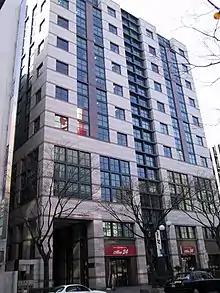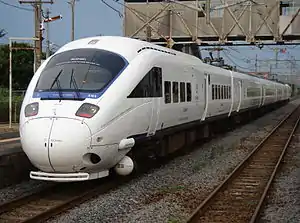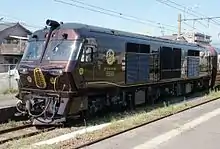Kyushu Railway Company
The Kyushu Railway Company[2], also referred to as JR Kyushu (JR九州, Jeiāru Kyūshū), is one of the constituent companies of Japan Railways Group (JR Group). It operates intercity rail services in Kyushu, Japan and the JR Kyushu Jet Ferry Beetle hydrofoil service across the Tsushima Strait between Fukuoka and Busan, South Korea. It also operates hotels, restaurants, and drugstores across its service region.[3][4] JR Kyushu's headquarters are in Hakata-ku, Fukuoka.[5]
.svg.png.webp) | |
 JR Kyushu headquarters (7th floor) near Hakata Station | |
Native name | 九州旅客鉄道株式会社 |
|---|---|
Romanized name | Kyūshū Ryokaku Tetsudō Kabushiki gaisha lit. "Kyushu Passenger Railway Share Company" |
| Type | Public KK |
| Industry | Rail transport |
| Predecessor | Japanese National Railways (JNR) |
| Founded | April 1, 1987 (privatization of JNR) |
| Headquarters | , Japan |
| Products | SUGOCA (a rechargeable contactless smart card) |
| Services | passenger railways freight services bus transportation Real estate development other related services |
| Owner | JRTT (1987-2016) Public float (2016-)[lower-alpha 1] |
Number of employees | 9,060 (as of April 1, 2016) |
| Website | jrkyushu.co.jp/english/index.html |
| Kyushu Railway Company | |||||||
|---|---|---|---|---|---|---|---|
.svg.png.webp) | |||||||
 Kyushu Shinkansen 800 series Tsubame | |||||||
| Operation | |||||||
| National railway | Japan Railways Group | ||||||
| Infrastructure company | Japan Railway Construction, Transport and Technology Agency | ||||||
| Statistics | |||||||
| Ridership | 331 million[1] | ||||||
| Passenger km | 9.191 billion per year[1] | ||||||
| System length | |||||||
| Total | 2,273.0 km (1,412.4 mi) [1] | ||||||
| Double track | 772.8 km (480.2 mi) (34%) [1] | ||||||
| Electrified | 1,341.1 km (833.3 mi) (59%) [1] | ||||||
| High-speed | 288.9 km (179.5 mi) (12.7%) [1] | ||||||
| Track gauge | |||||||
| Main | 1,067 mm (3 ft 6 in) | ||||||
| High-speed | 1,435 mm (4 ft 8 1⁄2 in) | ||||||
| Electrification | |||||||
| Main | 1,500 V DC overhead catenary 1,341.1 km (833.3 mi) | ||||||
| 25 kV AC 60 Hz overhead | 288.9 km (179.5 mi) Kyushu Shinkansen | ||||||
| Features | |||||||
| No. stations | 567[1] | ||||||
| |||||||
History
When Japanese National Railways was divided in 1987, Kyushu Railway Company inherited its assets and operations on the island of Kyushu along with losses of around 28.8 billion yen, exacerbated by a growing highway network in Kyushu and many lightly-used rural lines. After privatization, JR Kyushu diversified its business into new ventures such as fish and mushroom farming and car sales. Two of its more successful side ventures were the Beetle ferry, started in 1991, and the Trandor bakery chain, started in 1992. JR Kyushu also built up its premium rail services through the development of the Kyushu Shinkansen high-speed rail line and the Seven Stars in Kyushu luxury excursion train.[6]
The company introduced SUGOCA, a smart card ticketing system, from March 1, 2009.
JR Kyushu executed its initial public offering in October 2016.[3] Non-railway operations account for roughly 60% of the company's sales and most of its profits.[6]
Lines
Shinkansen line
- Kyushu Shinkansen (Kagoshima Route)
Main lines

- Kagoshima Main Line
- Nagasaki Main Line
- Kyūdai Main Line: Nicknamed Yufu Kōgen Line
- Hōhi Main Line: Nicknamed Aso Kōgen Line
- Nippō Main Line
- Chikuhō Main Line: Divided to three segments with different nicknames, namely Haruda Line, Fukuhoku Yutaka Line, and Wakamatsu Line.
Other lines
- Chikuhi Line
- Fukuhoku Yutaka Line: A nickname for the route formed by portions of Kagoshima Main Line, Chikuhō Main Line, and the whole part of Sasaguri Line.
- Gotōji Line
- Hisatsu Line
- Hitahikosan Line
- Ibusuki Makurazaki Line
- Kashii Line
- Karatsu Line
- Kitto Line
- Misumi Line
- Miyazaki Kūkō Line
- Nichinan Line
- Ōmura Line
- Sasaguri Line
- Sasebo Line
Limited express and tourist train services

- Ariake (Hakata - Kumamoto)
- Aru Ressha (Ōita - Hita April to June)(Sasebo - Nagasaki July to September)
- Aso Boy (Kumamoto - Miyaji)
- A-Train (Kumamoto - Misumi)
- Hayato no Kaze (Kagoshima-Chūō - Yoshimatsu)
- Huis Ten Bosch (Hakata - Huis Ten Bosch)
- Ibusuki no Tamatebako (Kagoshima-Chūō - Ibusuki)
- Isaburo & Shinpei (Hitoyoshi - Yoshimatsu)
- Kaiō (Hakata - Nōgata)
- Kamome (Hakata - Nagasaki)
- Kawasemi Yamasemi (Kumamoto - Hitoyoshi)
- Kirameki (Mojikō - Hakata)
- Kirishima (Miyazaki - Kagoshima-Chūō)
- Kumagawa (Kumamoto - Hitoyoshi)
- Midori (Hakata - Sasebo)
- Nichirin/Nichirin Seagaia (Kokura - Miyazaki Kūkō)
- Seven Stars in Kyushu (Circular tours of Kyushu)
- SL Hitoyoshi (Kumamoto - Hitoyoshi)
- Sonic (Hakata - Ōita)
- Trans-Kyushu Limited Express (Hitoyoshi - Ōita)
- Umisachi-Yamasachi (Miyazaki - Nangō)
- Yufu / Yufu DX/Yufuin-no-mori (Hakata - Ōita)
See also
- Kyūshū Railway - a predecessor of JR Kyushu
Notes
- Largest shareholders:
Morgan Stanley investment accounts(5.55%)
TMTBJ investment trusts (4.80%)
J.P. Morgan investment accounts (3.39%)
SSBTC TREATY 505234 (2.84%)
References
- "Fact Sheets 2017" (PDF). Archived (PDF) from the original on 2018-07-09. Retrieved 2018-07-09.
- 九州旅客鉄道株式会社 Kyūshū Ryokaku Tetsudō Kabushiki-gaisha
- Cooper, Chris; Matsuda, Kiyotaka (October 16, 2016). "JR Kyushu Prices IPO at Top End of Range to Raise $4 Billion". bloomberg.com. Bloomberg L.P. Retrieved March 13, 2017.
- "Company Overview of JR Kyushu Drug Eleven Co.,Ltd". bloomberg.com. Bloomberg. March 13, 2017. Retrieved March 13, 2017.
- "Corporate Summary Archived 2009-12-09 at the Wayback Machine." Kyushu Railway Company. Retrieved on March 27, 2010.
- Kurimoto, Suguru (26 March 2015). "Japan rail company diversifies its way around disadvantages". Nikkei Asian Review. Retrieved 27 March 2015.